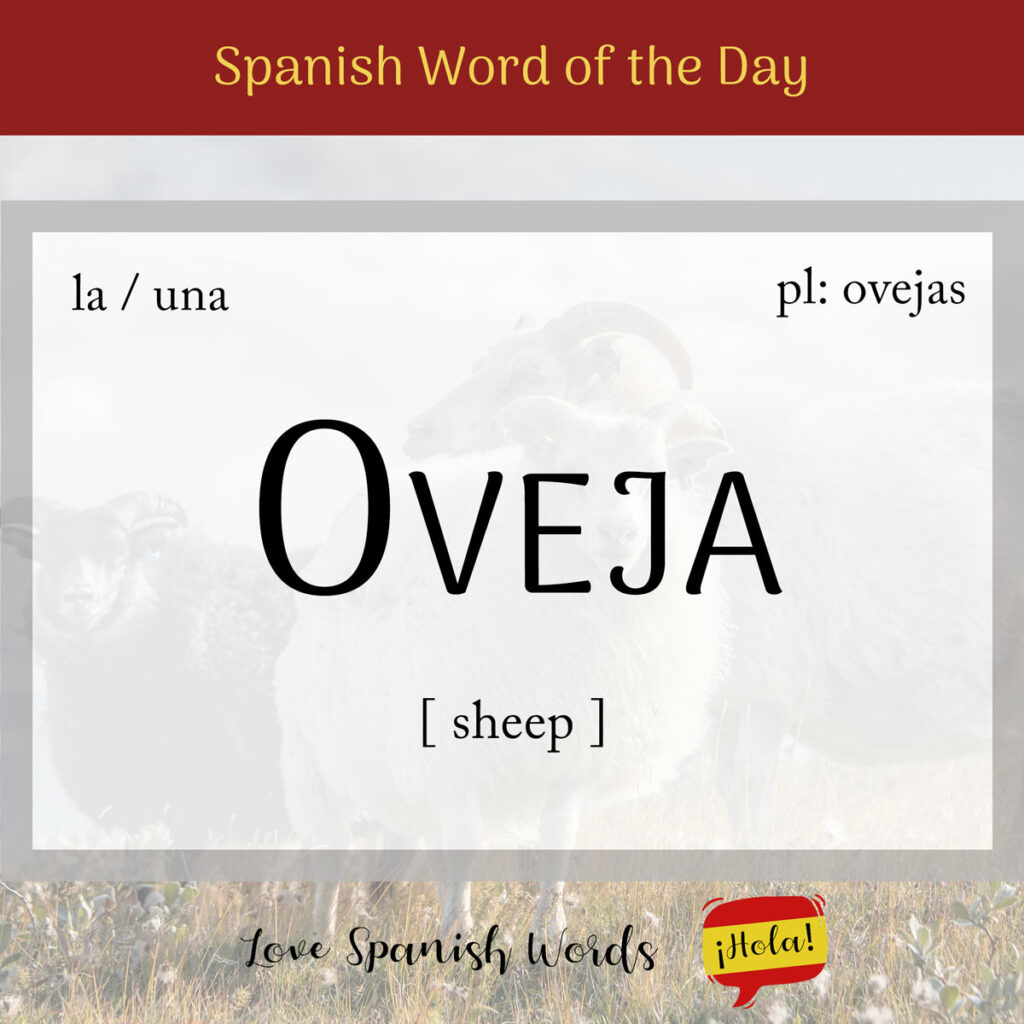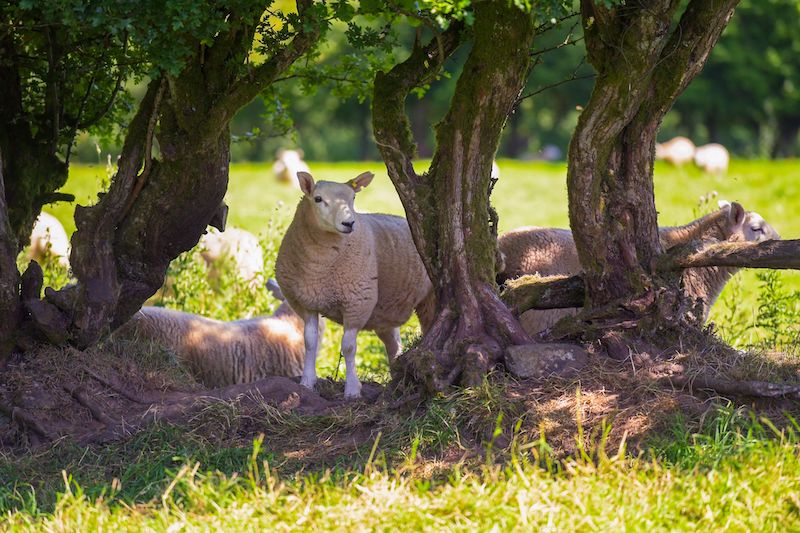Have you ever seen cute fluffy sheep grazing in a field? These friendly animals, called ovejas in Spanish, are known for their soft wool and gentle nature. They are essential in agriculture due to their wool, meat, and milk and are therefore found on many farms around the world. Let’s learn more about these interesting mammals.
Latin American Pronunciation
European Pronunciation

Oveja, meaning sheep in English, comes from the Vulgar Latin term ovēca, which in turn derives from the Latin word ovis, also meaning sheep.
Oveja is a feminine noun, and it takes the following definite and indefinite articles.
- la oveja = the sheep
- las ovejas = the sheep (plural)
- una oveja = a sheep
- unas ovejas = some sheep (plural)
Mi tío tiene muchísimas ovejas en su granja.
My uncle has many sheep on his farm.
Ovejas are well known for their abrigos esponjosos y de lana (fluffy and wooly coats) which can be white, black, or brown depending on the raza (breed). They have long ears and some have no cuernos (horns), regular short horns, or spiral-shaped horns. These cute animals are usually about 4 feet tall with sturdy bodies and short legs. They can weigh 45 kilos (100 lbs) or up to 136 kilos (300 lbs)!
Ovejas are social animals that live in groups called rebaños (flocks). They communicate with each other through a variety of balidos (bleats). These animals are known for their gentle and playful nature. Baby sheep are known as corderos (lambs). Adult males, which we call rams in English, are known as carneros in Spanish.
Here are some terms related to the word oveja:
- cordero = lamb (young sheep)
- rebaño = flock (a group of sheep)
- carnero = ram (adult male sheep)
- borreguito = ewe lamb (young female sheep)
- ovin = ovine (related to sheep, like canine is for dog)
- ovejero/pastor = shepherd (someone who tends to sheep)
Ovejas are known for having an excellent memoria (memory) and habilidades cognitivas (cognitive abilities). They can recognise and remember the faces of other sheep and humans for many years! This helps them form social bonds within their flock. They also remember the layout of their environment, the path to food and water sources and even remember past events where they encountered predators or found food. This helps them avoid peligro (danger) and recall safe areas. Plus, they can solve simple problems like navigating obstacles and they can respond to the cues and commands of farmers. They are very smart animals!
El pastor está buscando a la oveja porque se perdió.
The shepherd is looking for his sheep because it got lost.
Wild ovejas adapt well and can be found in various environments such as montañas (mountains), zonas rocosas (rocky areas), sierras (hills), and llanuras de hierba (grassy plains). These wild ovejas can jump up to 3 feet high which helps them get around their environment. Many sheep are kept on granjas (farms). In fact, ovejas have been domesticated for thousands of years, making them one of the oldest farm animals. They can live for about 10 to 12 years or even more.
Sheep are herbívoras (herbivores), meaning they only eat plants. Their diet mainly consists of césped (grass), hay, shrubs, and leaves. They spend most of their day pastando (grazing), up to 10 hours a day! Their stomach has four compartments that help them digerir (digest) tough plant material.

Fun Fact:
Ovejas have an interesting way of eating. They eat using the proceso de rumia (rumination process). This means they graze by nibbling on grass and swallowing it. After grazing, they find a resting spot to start the rumination process which involves them partially digesting food, called bolo (cud).
They bring this cud back into their mouths after swallowing it and lo mastican (chew it) again, but this time thoroughly. This helps break down the food even more to digest it better. Then, after re-chewing it, they swallow the bolo (cud) again so that it can continue through the digestive system and further break down and absorb nutrients. They can repeat this process more than once for the same food!
There are over 1,000 different kinds of razas (breeds) worldwide, each with unique traits. The most common is the Merino, known for its soft lana (wool). The black-faced Suffolk and the Dorper are both raised for their carne (meat). Sheep play an important role in agricultura (agriculture) because they provide wool, meat, and milk to many cultures.
Different cultures use sheep’s lana (wool) to make clothing, blankets, and other textiles. Their wool is a valuable resource around the world. Farmers also raise ovejas because they provide meat called lamb, or carne de cordero. Although sheep meat is eaten around the world, it is most popular in Middle Eastern cuisine to make kebabs, shawarma, and lamb stew. It’s also popular in Mediterranean regions to make Greek moussaka and Spanish lamb dishes. Ovejas also produce leche (milk) which is used to make queso (cheese) and yogur (yogurt).

Fun Fact:
One of the most famous ovejas in history was Dolly, a Finn Dorsett breed known for its lana (wool). Born in 1996 at the Roslin Institute in Scotland, she was the first mamífero clonado (cloned mammal) in history. She became famous and was a media sensation. Dolly’s birth proved to scientists that it was possible to clone a mammal from a célula (cell), which became a great discovery for genetics, biology, and medicine.
However, ethical questions were raised and this practice wasn’t welcomed by everyone. Dolly was diagnosed with enfermedad pulmonar (lung disease) by age 5, which was unusual, and it is believed it was because of her being cloned from an adult cell. She had to be euthanised by age 6 because of her health issues. Dolly’s body can now be seen at the National Museum of Scotland in Edinburg.
Cuando cuento ovejas, me ayuda a dormir.
When I count sheep, it helps me sleep.
Yo soy la oveja negra de la familia porque siempre hago lo que quiero.
I’m the black sheep of the family because I always do what I want.

Spanish idioms featuring ‘oveja’
Contar ovejas
Literal translation: to count sheep
English meaning: to count imaginary sheep jumping over a fence as a method of trying to fall asleep
Ser oveja negra
Literal translation: to be a black sheep
English meaning: to be a person different from the rest of the group, often in a negative or rebellious way
Ser como ovejas en el redil / ser oveja
Literal translation: to be like sheep in a pen / to be a sheep
English meaning: to be in a group of people who follow others blindly without thinking for themselves
Estar en la sombra de las ovejas
Literal translation: to be in the shadow of the sheep
English meaning: to be someone who is protected or hidden away, (to be safe, to imply safety in numbers)
Hacer ovejas
Literal translation: to make sheep
English meaning: to be distracted or daydreaming (spacing out)

